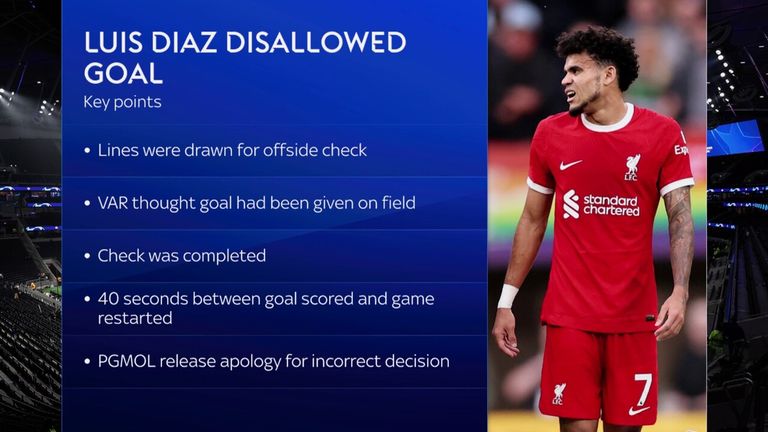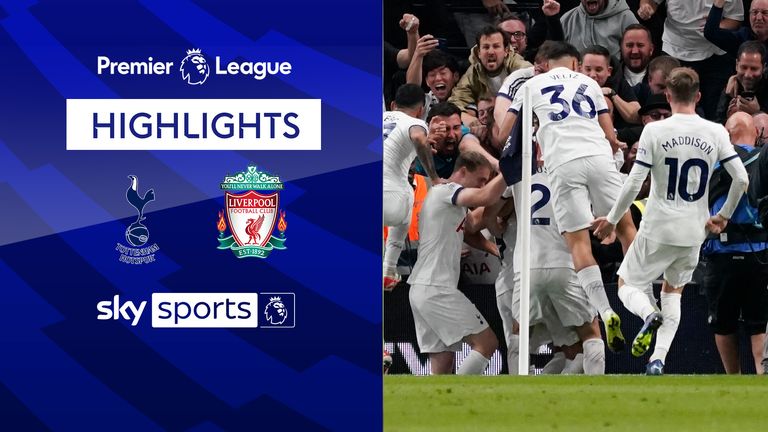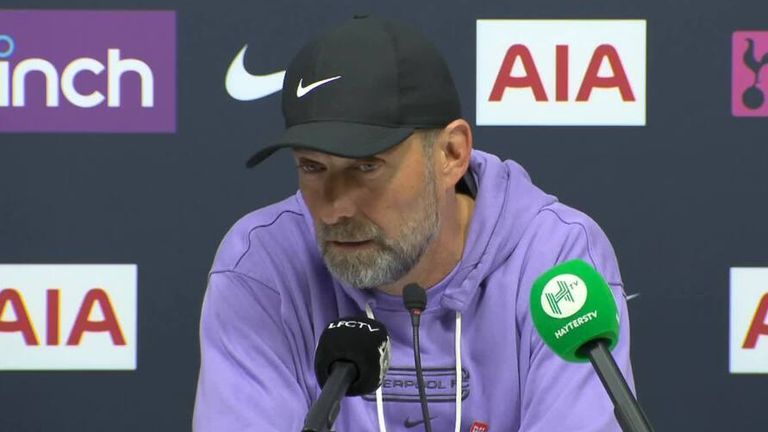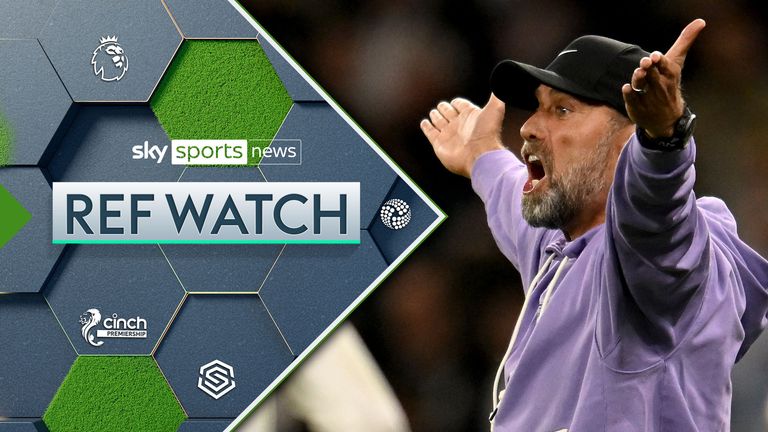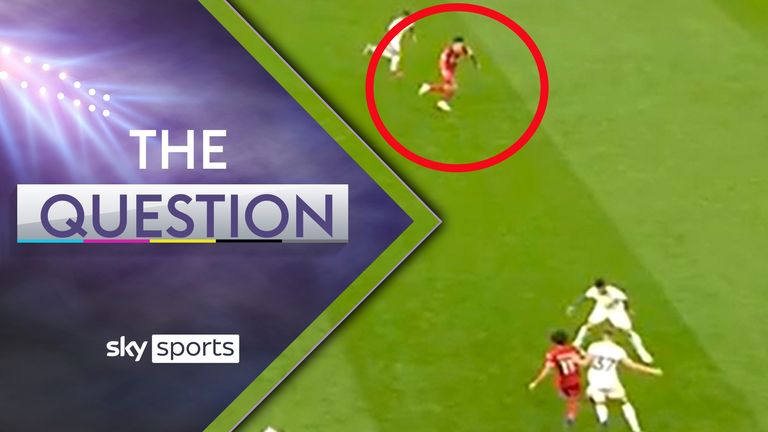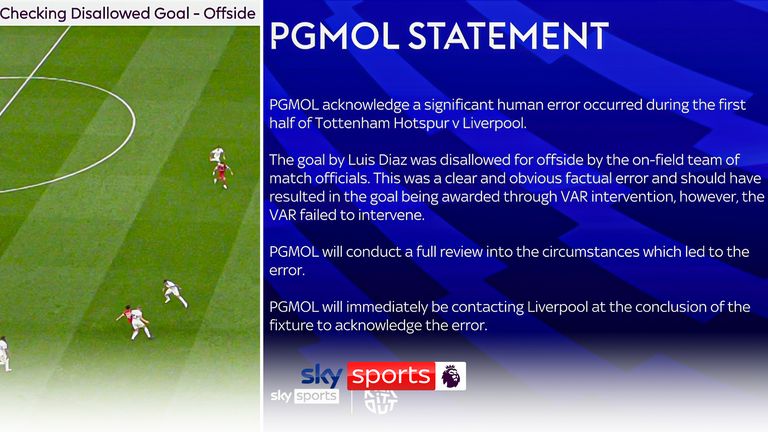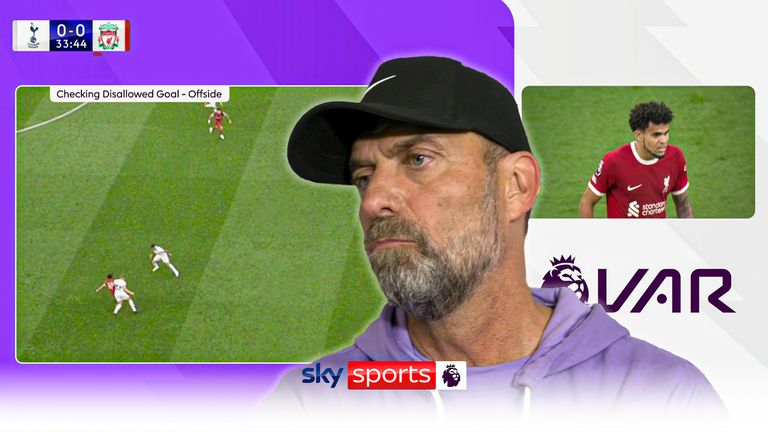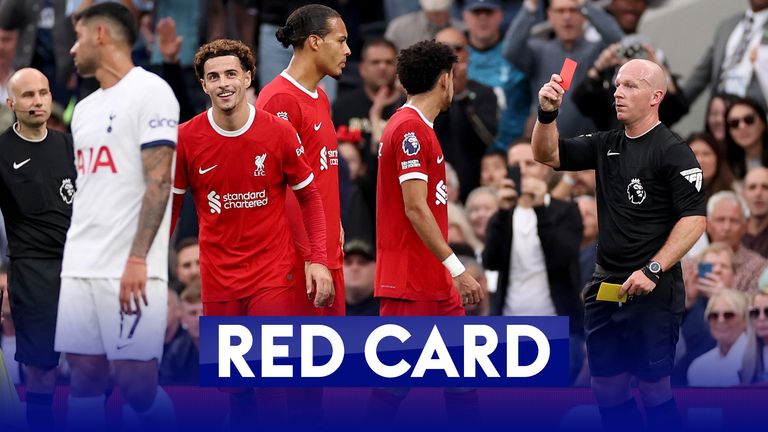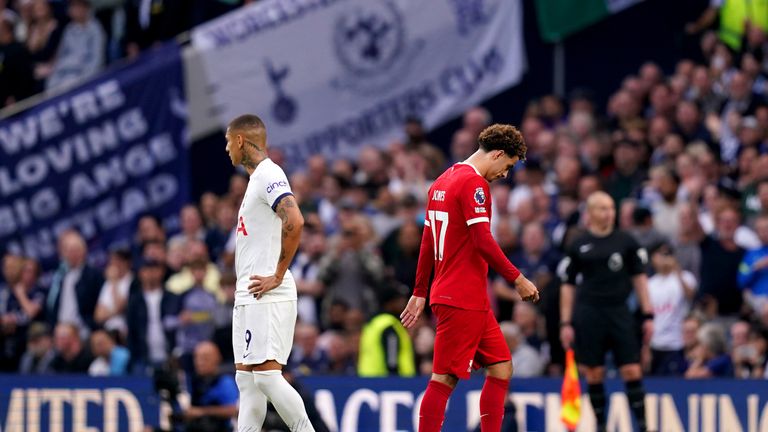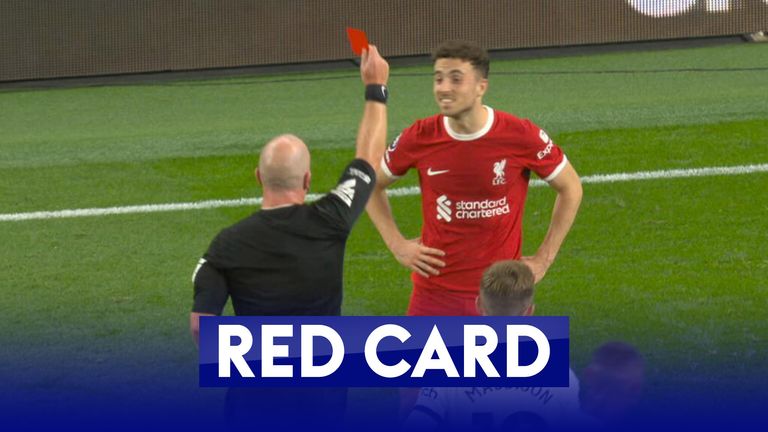In an extended Ref Watch, Dermot Gallagher looked back at a dismal weekend for VAR in the Premier League, with a particular focus on a goal for Liverpool’s Luis Diaz which was incorrectly ruled out for offside.
Jurgen Klopp’s side were taking on Tottenham on Saturday. The game was level at 0-0, with Diaz played through by Mo Salah before beating Spurs goalkeeper Guglielmo Vicario from a tight angle.
The offside flag went up, despite Diaz being onside – with VAR failing to overrule the decision. VAR mistakenly believed the on-field decision had been to award the goal, when in fact it had not.
This resulted in the VAR Darren England, despite realising that Diaz was onside, relaying a message of ‘check complete’ and the goal being ruled out.
Gallagher also revealed that the VAR team did not inform referee Simon Hooper about the error until half time.
There were less than 40 seconds between Diaz’s shot hitting the back of the net and play being restarted, while there were less than 10 seconds between TV viewers being shown a VAR review was taking place and the check being completed.
The PGMOL later apologised to Liverpool, who have vowed they will explore all their available options after eventually losing the game 2-1.
Former Premier League referee Gallagher described it as his ‘toughest ever matchday’, explaining: “There’s a lack of focus, lack of judgement by the VAR. They didn’t check what the on-field decision was and made a decision based on what he thought, rather than what he was told.
“It allowed the game to restart, and once it had restarted – the damage is done.
“Offside is the on-field decision. Without VAR, it still would’ve been offside.
“VAR is there to check every goal. He thought it was a goal, and for some reason felt a goal had been given on the field. He’s then checked, seen it is onside and said check complete.
“But he has another colleague with him, an AVAR, an assistant, a specialist in offside judgement. People can’t understand why he didn’t intervene and see the assistant had flagged.
“This escalates from an error from Darren England to having a colleague alongside him who should have also flagged it.
“In a situation like this, I was stunned on Saturday. It’s the toughest day I’ve ever had at work on a match day.
“You’re trying to explain to people what’s happened – and second-guess what’s happened, because they’re in a different location to myself. That’s what I can’t process.”
In a statement released by Liverpool, they said the controversy “undermined the integrity of the sport”.
However, Gallagher disagreed with the point, adding: “I don’t understand what that means, to be honest. I seriously don’t.
“It was a mistake, referees make mistakes all the time. It’s Sky Sports News‘ 25th birthday – you can find loads of mine in that time.
“It’s a very, very bad mistake, no doubt about that, but it’s a mistake.”
Why didn’t the VAR team stop the game?
A question that has been asked by fans and pundits alike, while we have also seen managers allowing the opposing team to score when a goal has been shrouded in controversy.
Perhaps the most famous example in England came in the Championship in 2019, when then-Leeds manager Marcelo Bielsa allowed Aston Villa to score after Jonathan Kodjia was injured in the build-up to Leeds’ opening goal.
The Football Show pundit Stephen Warnock gave his thoughts on how the process could have developed on Saturday, saying: “If we’re talking about the integrity of the game, that’s that Liverpool have scored a legitimate goal.
“Here’s where the rulebook goes out the window. It should, to keep the integrity of the game where common sense comes in.
“The VAR says to the referee ‘we’ve messed up,’ because they’ve made him look a fool, and that he needs to atone for their error.
“That could simply be by walking to the side of the pitch and telling the managers and captains to come in, tell them there’s been an error, and say it’s a goal for Liverpool and to recommend allowing Liverpool to score.
“The PGMOL could put up an announcement and everyone would’ve known where they stood. Now though, it’s an absolute mess.”
However, the IFAB rules on VAR state play cannot be brought back in a case like this.
Rule 10 says: “If play has stopped and been restarted, the referee may not undertake a ‘review’ except for a case of mistaken identity or for a potential sending-off offence relating to violent conduct, spitting, biting or extremely offensive, insulting and/or abusive action(s).”
Gallagher explained: “If I stop the game and give a penalty, then my assistant says it’s wrong because there’s no foul, I can change my mind.
“I can do that up until I restart play. At that point it’s decision over, you carry on. The VAR thought it was a goal, that’s the fundamental error.
“I’ve been assured at no point onwards did he tell the referee he had made a mistake from the 34th minute until half time.”
Gallagher says that the PGMOL must now reiterate the VAR process with their officials to ensure the same mistake does not happen again.
He said: “Now, it is to reaffirm what the process is, what they’ve got to do and what their responsibilities are and make sure that people take part in a decision.
“They’re there to do that and take part in the process correctly and drill down to everybody and that this has got to happen as a process to completion.
“It’s not good thinking ‘we want to be quick and get the game restarted’. Well if it takes an extra 30 seconds, which this might have done, that might have stopped me having to stay here until 12.15pm today [for an extended Ref Watch].”
And then there are the two red cards…
Liverpool’s unhappy trip to the Tottenham Hotspur Stadium continued as both Curtis Jones and Diogo Jota were sent off with a straight red and two yellows respectively.
Gallagher, along with Warnock and fellow The Football Show pundit Sue Smith, continued to dissect the incidents
WHAT HAPPENED: Jones was sent off for a late challenge on Yves Bissouma. After initially being shown a yellow card by Simon Hooper, it was later upgraded to a red after a VAR review.
GALLAGHER SAYS: “This is similar to [Chelsea’s] Malo Gusto against Aston Villa. It shows a consistent approach in as much as the same thing happens.”
SMITH SAYS: “It’s the still that’s worse than in real time. They should have shown it in real time too. He doesn’t mean to hurt him, he goes over the top of the ball, and the still makes it look worse and puts the decision in his mind.”
WARNOCK SAYS: “You can’t put something into someone’s mind first of all.
“You’ve got to show them the full run first of all – I didn’t think it was a red, but it’ll be a 50-50 split on that. You can lean either way on that.”
WHAT HAPPENED: Jota is sent off for two yellow cards at Tottenham, both for fouls on Destiny Udogie.
GALLAGHER SAYS: “The first yellow, from the referee’s point of view, does look like he’s tripped him, but not from the sideways angle.
“He had spoken to him just before and it’s a cumulative process. The problem is the referee doesn’t have two or three angles to go to during the game.”
WARNOCK SAYS: “It’s difficult, that one. The big thing is that VAR is struggling as it is, and then we’re almost wanting them to VAR that as well to see if it’s a yellow.
“We were sat this morning talking and saying it’s not a yellow. We know that because it’s a football movement.
“It’s about players understanding the game – and that’s no disrespect to referees, they have arguably the hardest job in the game.
“Jota never breaks stride. If Sue was in front of me and I wanted to trip her up, I would flick my ankle. You’d see the momentum of the stride changing.
“That gap between players and referees, it needs to be closer and it needs to be bridged.”

